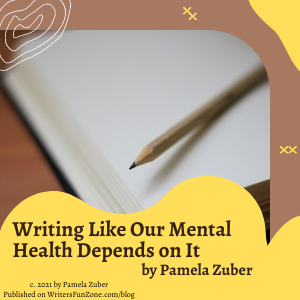Writing Like Our Mental Health Depends on It by Pamela Zuber
Today we welcome a new guest writer to Writer’s Fun Zone, Pamela Zuber who is stopping by to chat with us about “Writing Like Our Mental Health Depends on It.” Enjoy!
***
If you’re like me, COVID-19 and the global pandemic haven’t just been threats to our physical health, but our mental health as well.
On any given day, we might be:
- Worrying about our health and the health of others. We might also be grappling with concerns about our jobs, finances, children’s educations, and other worries.
- Feeling anxiety. We could be wondering if certain activities will be safe, whether we took proper safety measures in the past, and when we’ll receive a vaccine.
- Experiencing depression and loneliness because we haven’t been able to see loved ones, engage in activities, or do normal things in normal ways.
- Using alcohol or drugs to cope with our anxiety and depression and considering whether we need mental health rehab or other assistance.
- Facing repetition and monotony, where one day seems to bleed into the next like a real-life version of the movie Groundhog Day.
- Struggling with uncertainty and trying to make sense of everything, even while situations continue to change.
In short, we’ve been dealing with a lot and we’re continuing to face new, strange, and challenging stressors. But we can do things to fight back.
Writing is one of them.
For writing activities, we might consider:
Writing for Your Mental Health: Journal writing (Journaling)
Writing in a journal, also known as journaling, is a practice that can provide mental health benefits and help us examine our lives.
This practice requires us to write regularly.
If we do that, we can read past entries to determine if there are common themes.
We might notice that certain situations stress us out, for instance, so we can use this information to try to avoid such situations in the future.
While it’s best to write often, journaling doesn’t have to be detailed or elaborate.
Writing a few sentences or a paragraph every day can be enough.
Don’t worry about your grammar, spelling, or structure because you’re using your journal to document and track your thoughts and feelings.
Of course, you can also convert these thoughts and feelings into future works. Everything is potential material, right?
Blogging for Your Mental Health
You might want to care about your spelling and grammar a little more if you’re blogging, however. At the very least, those conventions can make it easier for others to understand you.
Contributing to a blog on a regular basis might be a good distraction if we’re bored, can’t leave home as often because of closures and safety reasons, or need a break from watching all those streaming shows. If we blog about a certain subject, we can write about ourselves a little and focus on something outside ourselves a little, which can provide a good balance.
Researching and writing about focused topics can engage our brains and make us feel good while we’re learning and discussing this newfound information.
As a bonus, blogging about our passions can help us connect online with others who share the same enthusiasm. By virtually interacting with people, we’re less likely to become lonely, depressed, and anxious.
And again, communicating with interesting people can ultimately help us enhance our blog and other writing.
Writing Fiction: Good for Your Mental Health
Are you reluctant to write about your feelings in a journal or discuss real people and events in a blog? Consider writing some fiction.
For example, I’ve been working on a story that features a judgmental old woman as one of its characters. She’s by far my favorite character to write, and others have also responded positively to her as well.
This character might be popular because she’s so mean when the rest of us have had to be so patient and understanding during these tough times. She doesn’t censor herself, and to feel this type of freedom ourselves, we might be living vicariously through her.
Thousands of years ago, Greek philosopher Aristotle stated that the arts can be cathartic.
Scholars note that the Greek word catharsis can mean both purging and purifying, so maybe writing can be a way to squelch negativity by producing something more positive. Even if it’s a work of fiction about some nasty old lady.
Editor’s Note: For more on bringing Aristotle’s ideas about the arts, check out the book, Wonderworks: The 25 Most Powerful Inventions in the History of Literature.
COVID-19 and Our Mental Health
COVID-19 and the pandemic have made life weirder and more difficult for most of us. There are still things beyond our control.
But while we can’t influence some conditions, we can control the way we respond to them. Writing about our emotions, interests, and desires is one such way.
***
About the Author
 Pamela Zuber writes nonfiction and fiction and has explored health and wellness, addiction and recovery, human rights, gender issues, and other topics. You can find some of her work on this page and can contact her at pamelaz@sunshinebh.com.
Pamela Zuber writes nonfiction and fiction and has explored health and wellness, addiction and recovery, human rights, gender issues, and other topics. You can find some of her work on this page and can contact her at pamelaz@sunshinebh.com.
***
Sources
sunshinebehavioralhealth.com – How Are Creativity, Mental Illness, and Substance Abuse Related?
urmc.rochester.edu – Journaling for Mental Health
health.qld.gov.au – Staying Connected While Being Physically Apart: Well-Being in the Time of Social Distancing
iep.utm.edu – Aristotle: Poetics







